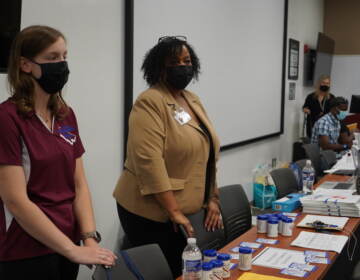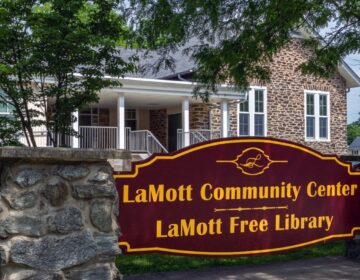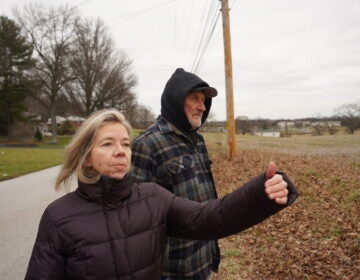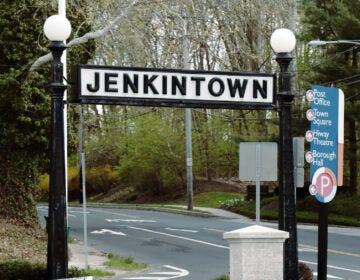‘It is not too late’: Pa. residents affected by Hurricane Ida can still receive FEMA aid
FEMA extended its application deadline to Jan. 10 for individuals and businesses in Montgomery, Bucks, Chester, Delaware, and Philadelphia counties.
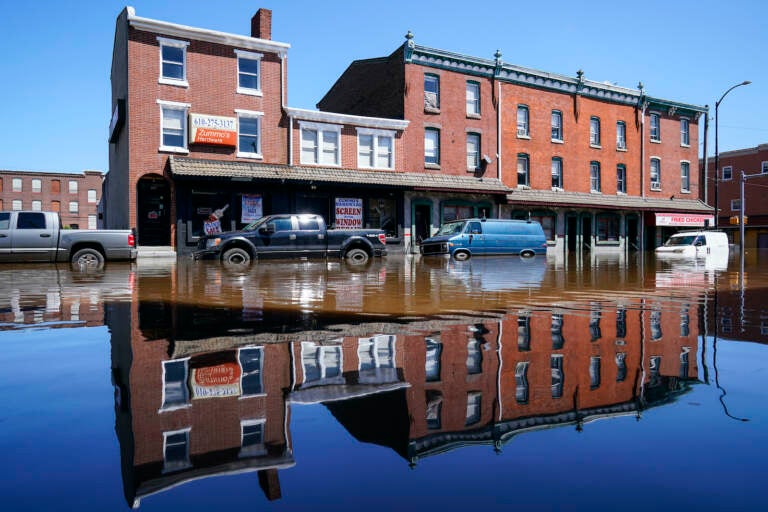
Vehicles are under water during flooding on Main Street in Norristown, Pa. Thursday, Sept. 2, 2021 in the aftermath of downpours and high winds from the remnants of Hurricane Ida that hit the area. (AP Photo/Matt Rourke)
Pennsylvania residents hit hard when the remnants of Hurricane Ida blasted through the region in early September now have more time to apply for financial assistance.
The Federal Emergency Management Agency has extended its application deadline for individuals and businesses in Montgomery, Bucks, Chester, Delaware, and Philadelphia counties, as well as Bedford, Northampton, and York counties. Those affected by the storm can now apply for FEMA aid until Monday, Jan. 10.
Loans are also available from the U.S. Small Business Administration to homeowners, renters, and business owners. The loans may cover losses not covered by insurance or FEMA assistance, as well as “business operating expenses that could have been met had the disaster not occurred.”
At the last Montgomery County Commissioners meeting of 2021, Chair Valerie Arkoosh urged residents to apply for the aid as soon as possible.
“So if you haven’t applied yet and you realize you do have need, it is not too late,” said Arkoosh.
Montgomery County had some of the hardest-hit communities in Pennsylvania. Over $11.2 million in federal aid has been distributed to county residents so far, said Arkoosh.
According to county officials, there are still 142 households, or 316 people, displaced by Ida’s destruction. Those families are living in 157 hotel rooms paid for by the county.
In Bridgeport alone, 300 people were evacuated from their homes and 500 were temporarily displaced.
ACLAMO, a local nonprofit that predominantly serves the Latino community, is supporting 52 families that were displaced and living in hotels. Ninety other displaced families are living with relatives or friends, and are not receiving as much aid from the county, according to Nelly Jimenez, the executive director of ACLAMO.
The deadline extension will help many individuals the organization works with, Jimenez said, adding, “We’re very happy. Every time [FEMA does] an extension, we are very happy.”
Many of ACLAMO’s clients had been denied FEMA aid. Now, the organization can help community members appeal those rejections.
Jimenez said the FEMA application process is difficult, especially for those who speak English as their second language.
“It is a very confusing system to use, even if you do speak English. And if you don’t speak the language, that makes it worse,” said Jimenez.
FEMA asks for specific details, such as how high the water rose in an individual’s home. How the water came inside, and/or how high it reached, has an impact on how much money individuals can receive.
After someone applies for aid, a FEMA inspector will reach out to schedule a home inspection. When ACLAMO requests a Spanish-speaking inspector from FEMA, Jimenez said, it often doesn’t receive one. Spanish-speaking families often end up not knowing when their inspections are, they miss their appointments, and then their applications are denied, she said.
People who are undocumented face extra barriers in receiving aid.
“That was eye-opening for me,” said Jimenez. “[FEMA markets] it like anyone who is in an emergency situation is going to be taken care of, and it’s not like that. If you’re undocumented and you don’t have have someone in your house with a Social Security number, you’re out of luck.”
Jimenez has been working in emergency response for four years in Montgomery County. She’s noticed a pattern.
“Everybody donates, everybody jumps the first week of the tragedy. And then everybody fades away with their money,” said Jimenez.
And then many families, now four months later, are left struggling.
“These people need to find homes. They still struggle with the remnants of what happened, and it’s not going to get better because there are a lot of people to place in permanent homes,” said Jimenez. “And it’s going to take a while until we can.”’
In Montgomery County, available affordable housing is decreasing, and it’s hitting communities of color the hardest.
Jimenez feels as if the people affected by the hurricane have been forgotten.
“These human beings are our neighbors, they are people in our pharmacies, in the supermarkets around the corner. They’re going through this, and no one knows,” said Jimenez, “It’s, like, invisible.”
Delores Sexton, 64, who described herself as Afro-American, said she will be applying for the FEMA aid.
Her building flooded, and she had to evacuate. She left all her belongings behind, and stayed in the county’s emergency shelter at Norristown High School. Eventually, Sexton moved into a hotel room paid for by the county for two months.
Recently, she moved into an affordable housing unit for seniors with just a bed. She had been on a waiting list for her new place for two years and is worried about making rent.
She hopes FEMA can help. “Whatever they can do to assure me that I’m not going to be homeless,” Sexton said.
Like Jimenez, Sexton said it seems as if those still feeling the impact of the hurricane have been forgotten.
“You live to learn that people don’t really care,” said Sexton. “If you weren’t affected by the hurricane, you would think that it was not as serious as it was. If you weren’t impacted by it, you have no idea.”
When Ida hit, Sexton had just started a new job at Wawa. While staying in the shelter, she couldn’t find public transportation nearby to get to work. Her hours have now been cut after missing a number of days.
“It was really difficult. They were not understanding of the situation,” said Sexton. “All they cared about was if we could get to work. And I’m like, ‘I’m homeless. I have no way of getting there.’”
“All of a sudden your life is shut down,” added Sexton, “And yeah, I wanted to be there, but my hands were tied.”
Moving forward, Jimenez said, the county needs to build more affordable housing, and find more permanent solutions to issues around houselessness and supporting working-class communities.
“There are beautiful, awesome people trying, including Montgomery County, trying our best. But I always feel that we are reacting,” said Jimenez.
She hopes instead of reactive plans, the county, local organizations, and community members can work together to create more preventative solutions.
“The climate is not getting better, things like this are going to happen. Like what is the plan in the future that we can all develop for what is yet to come? How can we do something now?”

Saturdays just got more interesting.
WHYY is your source for fact-based, in-depth journalism and information. As a nonprofit organization, we rely on financial support from readers like you. Please give today.



